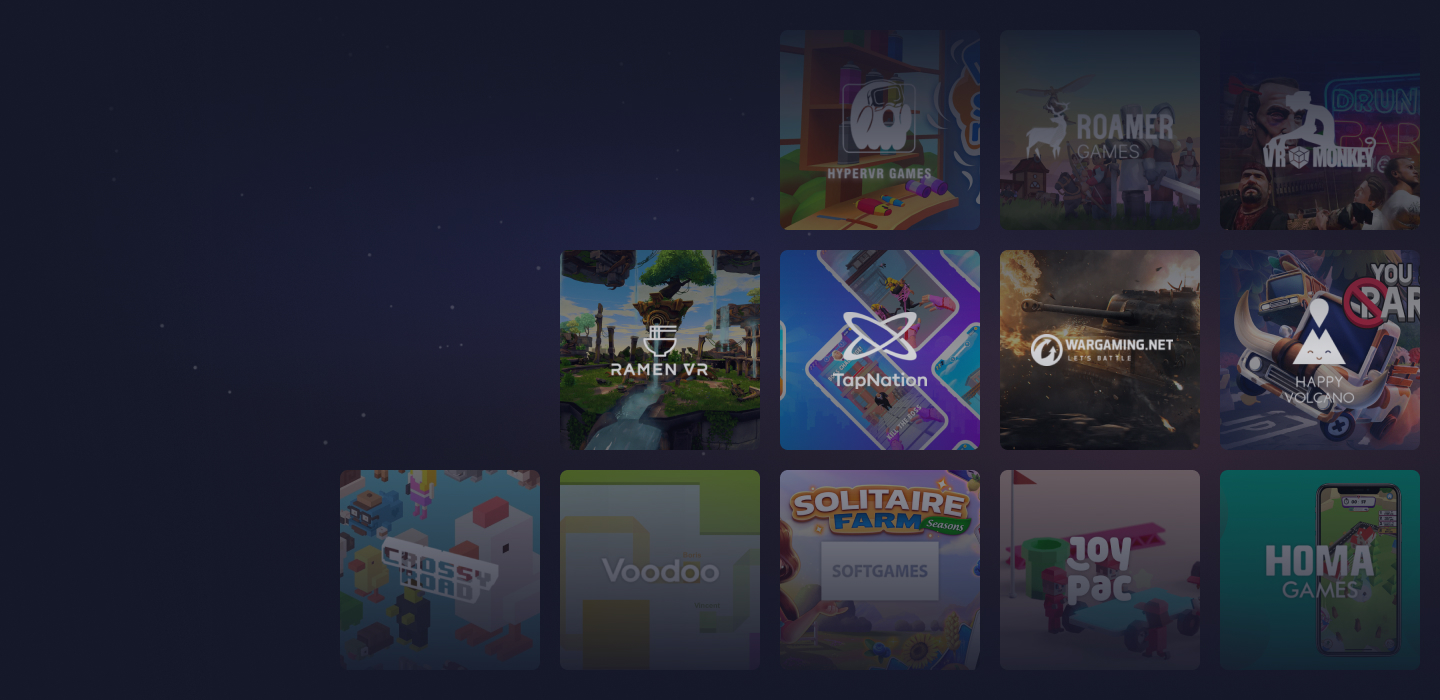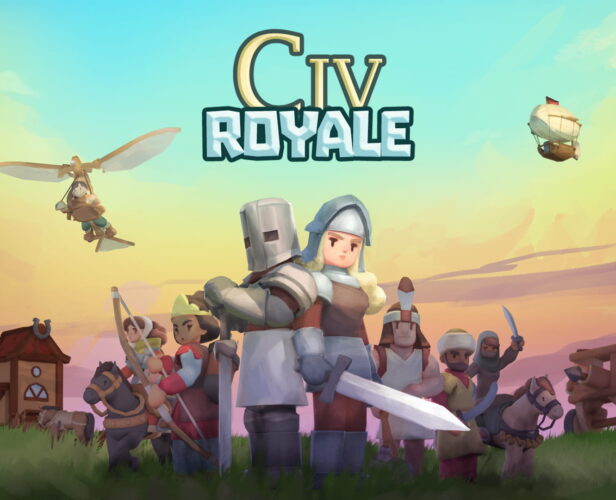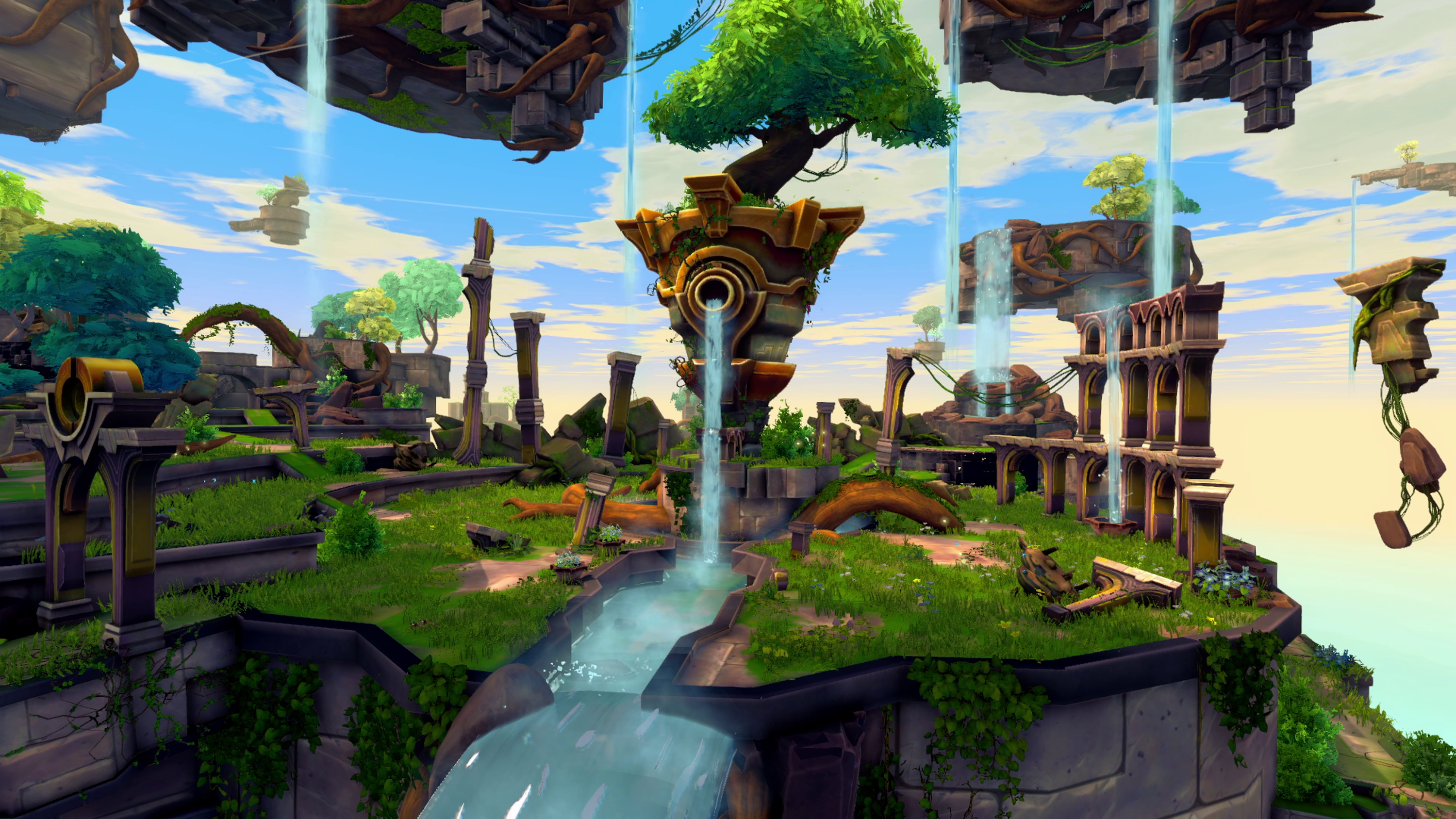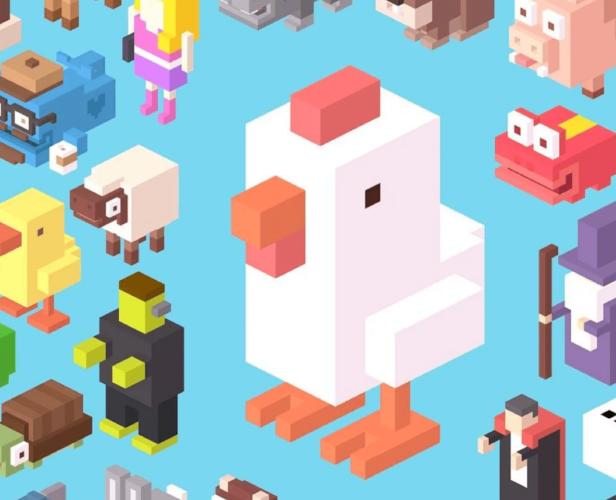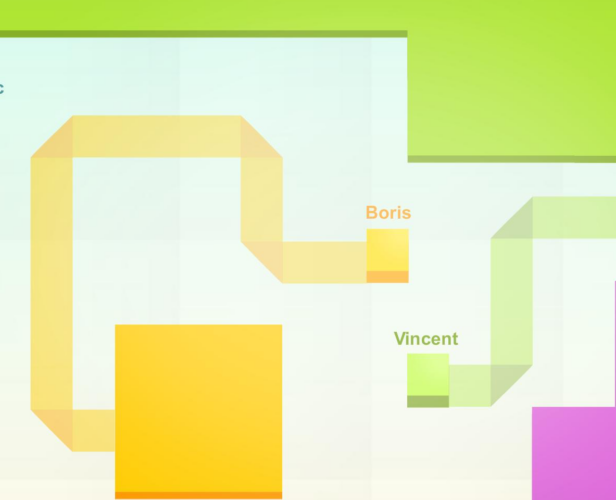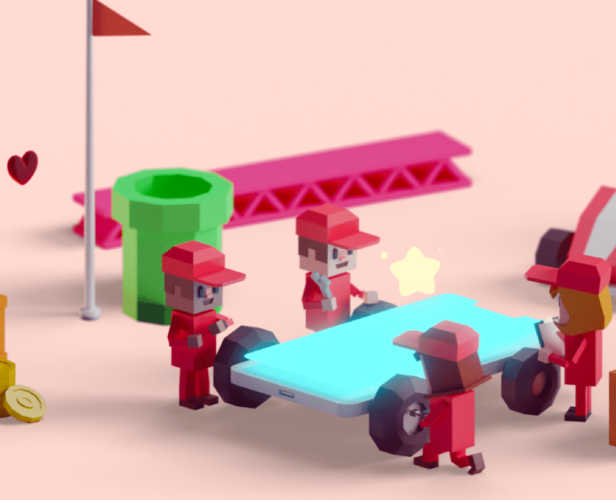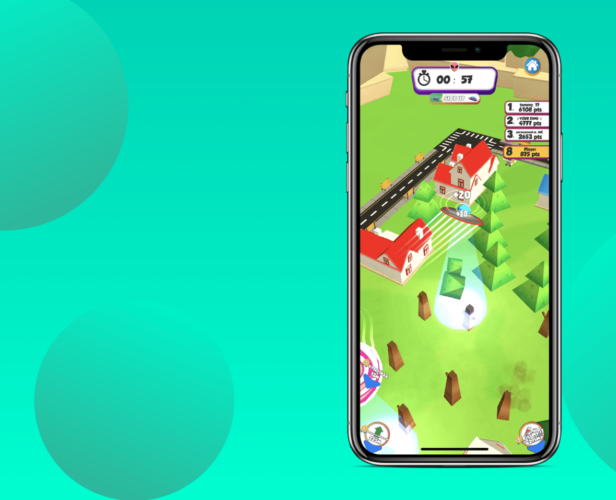Resources > Case Studies
Meet a few of our 60,000 connected studios
Learn how some of the best and brightest use GameAnalytics to release hit after hit.
#Case study
Insights in Action: VRMonkey’s Rise Fueled by GameAnalytics
VRMonkey, formerly known as Naked Monkey Games, embarked on a journey into VR a decade ago. Although their activities initially evolved around developing smartphone games, in 2015, after encountering Oculus Rift DK1, they decided to pivot fully into VR and AR development. Today, this indie studio comprises 40 dedicated team members who work on their own IPs and collaborate with renowned VR studios worldwide, including The Munky – creators of Drunkn Bar Fight. Among VRMonkey’s portfolio, their co-development of Drunkn Bar Fight stands out as one of their most successful ventures. This game is among the top 20 selling VR Games of all time, and it maintains a steady audience, with more than 100,000 MAU. During peak seasons and featured store placements, this number rises to 200,000 MAU. Harnessing the Power of Analytics VRMonkey recognized that they must fuel their...
#Case study
Roamer Games: Powering Game Development by Combining GameAnalytics and AI
Roamer Games is the new kid on the game development block. They are all about creating a mid-core strategy game that would give you the thrill of Civilization in just a five-minute gaming session. Early in the production, their team figured that to create a hit title, they needed to understand players’ behavior on a granular level. That’s where GameAnalytics’ data tools came into the picture. This case study breaks down how Roamer Games used GameAnalytics combined with AI technology to level up their game development. Understanding Roamer Games’ Needs and Challenges The game Roamer Games had in mind was a cross-platform but mobile-first marvel. Think iOS, Android, and WebGL. It’s a blend of Civilization and Clash Royale – a strategy with a dash of action. The studio needed the lowdown on how gamers played their game right from the...
#Case study
How GameAnalytics Empowers HyperVR’s Immersive VR Games
Analytics is a crucial ingredient to perfecting your games. But it can be a pain if it’s not available for you in one place. That’s why HyperVR use GameAnalytics.
#Case study
Developing a #1 VR MMO: Ramen VR’s Journey with GameAnalytics
Discover how Ramen VR used data-driven game development to launch "Zenith: The Last City", which became the #1 bestselling game all major VR platforms—including Meta Quest/Rift, Steam and PlayStation VR.
#Case study
Happy Volcano: why a growing studio picked Player Warehouse
A central location to come home to After launching You Suck At Parking, Happy Volcano wanted a central home for their analytics data. David Prinsmel, Happy Volcano’s game director, and their data engineer, Rahul Jani, found that Player Warehouse let them be more flexible around storing and processing their data. They could pull it all into one central location and then create their own visualizations off the back of that information. Here’s what they found along their journey. Focus on your onboarding process first If you want players to stick around, you need to make sure they feel comfortable in your game. So your onboarding process is vital to your success. Through their data, Happy Volcano realized that people were far more likely to drop off if they didn’t play through some of the single-player races before hopping over to multiplayer....
#Case study
How Splitting Point caught 80% more bugs with real-time data
Catching 80% of their bugs One of the main reasons that Splitting Point integrated GameAnalytics was because of our bug-tracking capabilities through our error reporting dashboard. This was particularly important to the studio as the Roblox platform is extremely fast-paced. They would be updating their game every week, and finish the changes two hours before the deadline. “We were pumping out updates every week on a Friday – and probably about 80% of the bugs we caught were because we were using GameAnalytics,” Janzen Maden, founder at Splitting Point, explained. Quite simply, there was no time for quality control. And it was also too complicated with such a small team. Soon, Splitting Point realized that they could find more than just bugs. They could check logical problems in the game design itself by using custom design events. “With Field Trip...
#Case study
Trihex Studios: delighting 40M players with analytics
GameAnalytics gave a voice to Redcliff’s silent majority Eric and Tae discovered early on that most developers can end up only listening to a few very vocal players. But those players often aren’t representative of the entire player base. For one, over half of Roblox’s players are under 12 years old. Not exactly the sort to engage with a developer or fill out an online survey. In fact, under most privacy laws — a developer isn’t even legally allowed to collect that information, as it could reveal personal information about a minor. “It’s not the user’s responsibility to tell you what they want, though,” Eric explained. “It’s our responsibility as developers to figure out what the player wants and needs in the game. But you need to be careful. It’s very easy to set up a Discord server and get...
#Case study
How TapNation uses DataSuite to increase the LTV of 19 hit games by 50% in only 6 months
Smashing obstacles with Giant Rush While they’ve seen huge improvements using DataSuite across their portfolio, one game stands out in particular: Giant Rush. (And not just because the character is huge.) The title has now reached over 140 million downloads. And, through a series of A/B tests and insights from the data they collected, they’ve been able to increase the LTV by a whopping 200% over six months for this specific title. “It’s because we A/B test every day,” Philippe Grazina from TapNation says. “We ask questions like: When are players leaving the game? For example, the boss in Giant Rush. If we spot that they’re leaving at the same point every time, we know we need to make a change. Small details like that really help.” Through these granular insights, TapNation can iterate and improve on their game step...
#Case study
How Wargaming uses GameIntel to focus on successful game ideas
They could focus their efforts When testing out concepts, it’s difficult to know which ideas will be successful and which will be a waste of effort. In the past, Wargaming’s data didn’t give them quite what they needed and wasn’t particularly scalable. It also didn’t feel fair to their studios. With GameIntel, specifically metric data from Benchmarks+, they could create realistic targets for studios to reach and base their decisions off the data. They now know what KPIs are considered good, great, and downright poor in the industry for each key sub-genre, rather than just guessing. “Success isn’t always about releasing a game. It’s sometimes about shutting a game down soon enough so that you don’t waste time and money,” said Alex Nenadavets, their manager of competitive intelligence. “We’ve definitely saved time by not wasting it on ideas that wouldn’t...
#Case study
How the devs behind Crossy Road and Shooty Skies became mobile masters
Never spend too long creating a game “For Crossy Road, we made it in 12 weeks, but we actually set out to make it in six,” says Sum. “That all meant that, if it didn’t go well, we hadn’t wasted all that much time. You just don’t know what’s going to happen on mobile. If you take six months to make a game, everything might have changed by the time it comes out.” Finding a team that gels “Every member of the team has their own skills that complement each other,” Sum is keen to note. “Matt Ditton handles a lot of the business side, but he’s a technical programmer too. Whereas Ben is really technically awesome and led the development of Shooty Skies.” Even though they now have a bigger team, Sum said his goal was to create “something...
#Case study
How Voodoo identifies hundreds of hit titles with GameAnalytics
Topping the charts Speaking at Casual Connect Europe in London, CEO Alexandre Yazdi said that Voodoo was on track to reach 6 billion downloads for its games in 2022. In fact, as of 2020, Voodoo games have now been downloaded more than 1 billion times. “The Voodoo process is less of a secret and more of a mindset, a way of working.” Alexandre Yazdi, Voodoo CEO Where it all began Voodoo started as a small team developing and releasing their own creations, and they weren’t immediately successful. What initially began as a failed attempt to bring the titles Bool and Quiz Run to market set in motion an epic journey as a publisher focusing on honing game retention, UA, and monetization optimization. The first chart-topper of Voodoo as a publisher was Paper.io, which became their first major hit back in...
#Case study
How JoyPac uses GameAnalytics to evaluate games for publishing in Asia
Having released 18 successful mobile games in a 7 month period, JoyPac is proving that hyper-casual titles can make it big in Asia. The founding team at JoyPac has decades of experience releasing mobile games across the globe, including throughout Asia. They have first-hand knowledge of the pitfalls that most Western game developers face when trying to break into these markets. That’s why JoyPac was founded on a strong belief of improving transparency, clear communication, and building close partnerships with game developers looking to break into Asia. GameAnalytics helps JoyPac deliver on that promise with uncapped access to global performance data, giving their partners the ability to analyze and optimize their stats – for free. JoyPac’s Western team is based in Copenhagen, which helps them address a lot of the problems that developers often encounter when dealing with publishing partners...
#Case study
How Homa Games uses GameAnalytics to propel their game into top charts globally
After reaching #1 in Korea’s Top Game Charts in less than 48 hours, Homa Games knew it was just the beginning of what was to come. Despite their recent success in Korea, the studio remains humble as it continues its core mission of helping developers in making their games into the next big hits. Focusing primarily on the hyper-casual market, the studio has published six games that have hit charts globally in the US, Korea, Japan, and China. The foundation of their success is partly due to their core values around transparency, ensuring open communication and respect of all developer intellectual property. Being a product of their successful sister company BidMotion, the Homa Games team is made from experts in user acquisition and monetization. With this industry experience and knowledge, they’re able to help developers achieve the best results possible...
